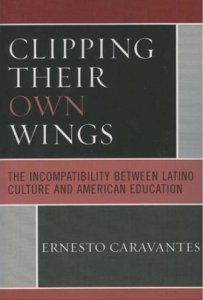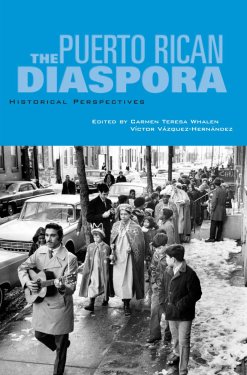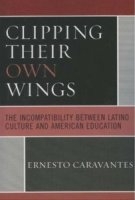Posted by Elena del Valle on July 20, 2007

Keeping the Faith cover
Photo: HarperCollins Publishers
In Keeping the Faith How Applying Spiritual Purpose to Your Work Can Lead to Extraordinary Success (Rayo, $22.95), Ana Mollinedo Mims describes how she arrived in the United States as a Cuban immigrant and eventually thrived in the corporate world. In the book, meant for anyone who has a job or hopes to be employed, she proposes to the reader that each struggle becomes an opportunity to grow spiritually, develop a purpose and achieve professional success. She believes that the answers we seek will reveal themselves more clearly and lead us to satisfaction through a blending of faith and work.
“My book is about developing a relationship with God that will lead to understanding one’s purpose and calling. I rarely talk about where I go to church because what is important is having the relationship not where you go to church. My book is not written from a denominational perspective and applies to everyone and anyone that has or is interested in developing a relationship with God regardless of where they go to church. God is the God of all not just one race or culture and I believe loves us all equally,” said Mollinedo Mims. “I was recently interviewed by Club 700 Hoy, the Hispanic version of the 700 Club and the response there was awesome. There are not many Hispanics, and specifically female Hispanics for the matter speaking about faith and how it applies to the workplace and to career development. So the response from all has been very rewarding.”
In Keeping the Faith, Mollinedo Mims, chief corporate communication officer, Cable & Wireless, Americas & Caribbean, discusses seven principles, faith, integrity, humility, prayer, forgiveness, stewardship, and legacy. The 256-page hardcover book is divided into three parts: Rebirth, Principles of the Spirit Led Career and On Reflection.
Mollinedo Mims has held executive positions with Fortune 500 companies and non profit organizations in strategic development, communications, media and corporate relations, government and investor relations, and website design. Prior to working with Cable & Wireless, she was global vice president of communications, Community Affairs & Diversity for Starwood Hotels & Resorts Worldwide, Inc.

Click here to purchase Keeping the Faith
Comments:
Filed Under: Books
Posted by Elena del Valle on July 13, 2007

Photo: Level 4 Press
Is Erik Rush a forward thinking problem solver or a land hungry imperialist? In the 220-page book Annexing Mexico: Solving the border problem through annexation and assimilation (Level 4 Press, $24.95) he shares his plans to take over Mexico in order to solve the United States Mexico immigration issues.
He argues that the 2,000 mile United States and Mexico border is more than just a boundary between nations; he sees it as a chasm that separates a wealthy global superpower from a poverty-stricken Third World Country. Perhaps, as he believes, the Mexico border has become a finish line for millions of Mexicans desperate for a better life. Instead of protecting the border, Rush says, get rid of it by absorbing the entire country.
“We’re like a dog chasing its tail,” said Rush. “We spend billions of dollars each year to keep immigrants out, then billions more on their education and healthcare once they get here anyway. We’d be smarter to spend those billions to improve and annex Mexico. We would solve the immigration problem and reap a host of other benefits.”
On the other hand, researchers point out that immigration from Mexico to the United States is past its peak and showing signs of slowing down further. They also say that the Mexican economy is likely to improve, reducing the desirability of northern migration.
Rush readily admits that a peaceful annexation of Mexico is a huge project that would require arduous political, economic and cultural work and years of integration. He points to polls that show 40 percent of Mexicans would like to live in America and 10 percent of Mexico’s population is already here. Would American’s ever agree to annex Mexico? How about Mexicans? Could it work? Would it matter that the reason Mexicans have migrated in the past is less relevant today and for years to come?

Click here to purchase Annexing Mexico
“Mexicans are generally a hard-working, family-oriented population,” said Rush. “Most Americans can appreciate those traits. The problem now is U.S. taxpayers are rightfully angry about carrying someone else’s load. The animosity will dissipate when the burden is shared equally by annexing Mexico and improving conditions there.”
Rush believes merging with the United States would bring health care benefits to Mexico, save American taxpayers $1.4 billion in emergency medical care to undocumented immigrants, and provide the combined country with energy independence thanks to Mexico’s oil reserves.
“Mexico has huge oil reserves that could eliminate our reliance on OPEC,” said Rush. “The state run oil business in Mexico operates at a loss right now, which is testament to the corruption in the Mexican government. There’s no excuse for this; it’s time for a dramatic change.”
Rush was born in New York City in 1961, the first child of a white father and a black mother. His family lived in the same neighborhood as Betty Shabazz, widow of slain civil rights activist Malcolm X, and her children. As a result he grew up keenly aware of the unfolding civil rights issues of the day. Rush has worked as a musician and a biomedical researcher.
In 1996, one of his short stories won a Chrysalis first place award for short fiction. His first novel, The Angels Fell, was released in 2002. Rush is a contributor of social commentary to WorldNetDaily and is a staff writer and acting associate editor and publisher for the New Media Alliance, Inc., a non-profit national coalition of writers, journalists and grass-roots media outlets.
Target Latinos effectively by anticipating changes in the market with
“Hispanic Projections” audio recording

Presenter Roger Selbert, Ph.D.
Find out
- About Latino buying power growth in the future
- How Latino market growth compares with other markets in the U.S.
- What drives the rise of Latino economic clout
- Who should target the Latino market
- What is the size of the Hispanic affluent market
- If the luxury Latino market is growing
- About Hispanics who earn more than $100,000 annually
Click here for details on “Hispanic Projections”
Comments:
Filed Under: Books
Posted by Elena del Valle on July 6, 2007

Fonda San Miguel cover
Photo: Fonda San Miguel
South-of-the-border salads, tapas, and mixed drinks that won’t keep you locked up in a hot kitchen for hours is the promise of a Fonda San Miguel: Unique South of the Boder Recipes for Summer Celebrations (Shearer Publishing, $34.95). Tom Gilliland and Miguel Ravago, owners of Fonda San Miguel restaurant in Austin, Texas with the help of food writer Virgina B. Wood put together a collection of their favorite easy-to-prepare restaurant recipes in the hardcover book, a 2006 International Association of Culinary Professionals (IACP) award-winning cookbook.
Recipes include Tequila-Cured Salmon Tostadas, Ceviche Veracuzano, Tostadas de Cochinita Pibil, Quesadillas de Hongos, and Albondigas en Chipotle from the Mexican regions of Vera Cruz, Yucatan, Chihuahua and Mexico City that the authors have served at their Texas restaurant.
“We had a grand dream, little experience, and a lot less cash when we began,” said Gilliland. “I love it as much today as the first day we opened. The title of our cookbook captures the dual focus of Fonda San Miguel, food and art. Distinctive Mexican art and décor is the best complement to authentic Mexican food.”
Gilliland and Ravago also share Mexican summer cocktails in the book. Some of the original concoctions included on the restaurant’s bar menu and in the cookbook are Fresh Lime Margaritas, Mango Margarita, Palomito (Grapefruit Soda Margarita), Sangría Fonda San Miguel, Agua de Sandía (Watermelon Water), and Cazuela Guadalajara (Tropical Tequila Punch).
Click here to purchase Fonda San Miguel
The large and colorful book is filled with photographs of the appetizing dishes and the restaurant’s interior. There are photos of the tropical courtyard, custom made punched-tin light fixtures, some of the hand-painted stuccoed walls of the hacienda-style restaurant, furnitute and distinctive artwork.
Gilliland is a graduate of the University of Nebraska and the Law School of the University of Texas at Austin. He studied law at the Universidad National Autónoma de México in Mexico City, as well as at the American Institute of Foreign Trade (now the Garvin School of International Management) in Glendale, Arizona. A co-founder of San Angel Inn and Fonda San Miguel, Gilliland oversees the front of the house staff and directs the interior design and art collection.
Ravago first learned to cook from his grandmother, a native of Sonora, Mexico. A co-founder of San Angel Inn and Fonda San Miguel, he has specialized in regional Mexican cooking for more than thirty years. Ravago co-authored Cocina de la Familia with Marilyn Tausend in 1997. The book won a Julia Child cookbook award in 1998, and was later published in Spanish.
Wood, a native Texan and a graduate of the University of Texas at Austin, began her professional cooking career as the first pastry chef at Fonda San Miguel restaurant in 1977. She went on to operate her own wholesale dessert and catering company for many years before becoming a food journalist. She is the food editor at the Austin Chronicle.
Comments:
Filed Under: Books
Posted by Elena del Valle on June 29, 2007

The Power of Business en Español cover
Photo: HarperCollins Publishers
Jose Cancela, a Miami businessman and marketing consultant, discusses his thoughts on the importance of marketing to Spanish-language consumers in the recently published title The Power of Business en Español: Seven Fundamental Keys to Unlocking the Potential of the Spanish-Language Hispanic Market (Rayo, $19.95). The 199-page book outlines the importance of becoming aware of and targeting Spanish speaking Latinos in the United States.
Cancela, owner of Hispanic USA Inc., outlines in seven chapters the concepts he believes will help marketers understand Latino consumers. He focuses on similarities between Latinos, the size, importance and location of the markets, Hispanics’ love for the United States, Latino voting power, religion, family values and buying power, and why he feels it’s essential to reach out to this market segment in Spanish.
He also discusses briefly the Latino baby boom, hypergrowth markets, Latino versus Anglo values, Spanish speaking population estimates, top 10 advertisers on Hispanic websites, favorite websites for Spanish language surfers, and businesses likely to grow among Latinos.
For his insights he relies on 25 years of experience working with Spanish dominant Latinos in the top 50 U.S. Hispanic markets; and on behalf of brands like Proctor & Gamble, Toyota, Verizon, Kellogg’s, Pepsi, ING, Group 1 Automotive, ABC Radio en Espanol, ESPN Deportes Radio, King World Productions and US Century Bank.
In 1979, Cancela began his career as a sales trainee at the Univision station in Miami, WLTV/Channel 23. He went on to run a TV station in Phoenix at the age of 27 and later managed station groups for the Univision and Telemundo television networks. Subsequently he launched a start up, National Hispanic Radio Network, and ran for mayor of Miami-Dade County.

Click here to purchase The Power of Business en Espanol
Discover how to reach Latinos in language today with
“Hispanic Market Translation Issues” audio recording

Presenter Martha E. Galindo
Translation company owner Martha E. Galindo explains
-
Why it’s important to reach your clients in language
-
Ins and outs of translations issues
-
How to select a translator
-
What to expect
-
How to save on translation costs
-
Much more
Click here to purchase “Hispanic Market Translation Issues”
Comments:
Filed Under: Books
Posted by Elena del Valle on June 25, 2007

Ernesto Caravantes, author, Clipping Their Own Wings
Photos: Ernesto Caravantes
A podcast interview with Ernesto Caravantes, author, Clipping Their Own Wings is available in the Podcast Section of Hispanic Marketing & Public Relations, HispanicMPR.com. During the podcast, Ernesto discusses his book with Elena del Valle, host of the HispanicMPR.com podcast.
Ernesto Caravantes is a native Angeleno who grew up in Lakewood, California. He was the only son of Mexican immigrant parents who instilled a deep sense of wonder and pride in his Mexican roots and had a profound impact on the choices and accomplishments in his life. They emphasized the value of education in the United States for those who want the best life possible, even the American Dream.
As a boy he visited the meat markets of Los Angeles and saw firsthand how beleaguered and unassimilated the Hispanic population had become in California. Latino immigrants were living in Los Angeles as if they had never left their native country. They remained poor, uneducated, and laboring at menial low-wage jobs with a stubborn resistance to learn English.
Ernesto’s parents were bilingual and spoke Spanish at home until he reached the second grade. His teacher told his parents, “Teach this boy English or go back to Mexico.” As a result his parents began a long crusade of English immersion. Although his early struggles to learn English as a first-grader along with subsequent remedial English classes, challenged his confidence they fueled a determination to succeed. As an adult, he expanded his skills, completing a Masters’ Degree in Counseling from the University of La Verne, hosting an educational cable television show, and becoming committed to lifelong learning.
Buy your copy of Ernesto Caravante’s Clipping Their Own Wings
Click here to purchase Clipping Their Own Wings
In Clipping Their Own Wings The Incompatibility between Latino Culture and American Education, Caravantes describes how the Latino culture itself is the culprit for Hispanic underachievement in the United States. He explains how Hispanics can advance themselves in society, without necessarily having to give up the beauty, spirit and lyricism that have given so much richness to Latin American culture.
To listen to the interview, scroll down until you see “Podcast” on the right hand side, then select “HMPR Ernesto Caravantes,” click on the play button below or download the MP3 file to your iPod or MP3 player to listen on the go, in your car or at home. To download it, click on the arrow of the recording you wish to copy and save it to disk. The podcast will remain listed in the June 2007 section of the podcast archive.
Click the button to hear the podcast:
Target Latinos effectively by anticipating changes in the market with
“Hispanic Projections” audio recording

Presenter Roger Selbert, Ph.D.
Find out
- About Latino buying power growth in the future
- How Latino market growth compares with other markets in the U.S.
- What drives the rise of Latino economic clout
- Who should target the Latino market
- What is the size of the Hispanic affluent market
- If the luxury Latino market is growing
- About Hispanics who earn more than $100,000 annually
Click here for details on “Hispanic Projections”
Posted by Elena del Valle on June 15, 2007

Salsa, Soul and Spirit book cover
Photo: Berrett-Koehler
Juana Bordas, president, Mestiza Leadership International, has made a career out of leading and coaching future leaders. In her first book, Salsa, Soul, and Spirit: Leadership for a Multicultural Age (Berrett-Koehler Publishers, $17.95), a May 2007 title, she shares insights on multicultural leadership gained from interviews with national multicultural leaders and her career long experience.
In the 226-page paperback book, she describes eight core leadership principles she feels are common to Latino, African-American and American Indian cultures. She also discusses how incorporating these principles into mainstream leadership efforts will result in more effective and inclusive strategies than those commonly adopted. In addition to interviews with national multicultural leaders, the book includes historical background and the author’s reflections.
“The purpose of Salsa, Soul, and Spirit is two-fold. First to integrate the wisdom and experience of Latino, Black and American Indian communities into a new and more inclusive form of leadership for our country that is more suited to our multicultural age and global village,” said Bordas. “Second to find the common ground in the way communities of color exercise leadership which will cultivate a great unity and ability for them to work together more effectively.”
In the book, Bordas shares the insights gained from interviews with 11 American Indian, African American and Latino leaders. The American Indian leaders are Ada Deer, John Echohawk, LaDonna Harris, and Benny Shendo, Jr. The African American leaders are James Joseph, Ph.D., Lea Williams, Ed.D and Andrew Young.
The Latino leaders Anna Escobedo Cabral, Treasurer of the United States; Antonia Pantoja, Ph.D., Puerto Rican Civil Right Movement activist; Federico Peña, managing director, Vestar Capitol Partners; and Raul Yzaguirre, former president of the National Council of La Raza.
A Colorado resident and former U.S. Peach Corps volunteer, Bordas is a founder of Mi Casa Women’s Center and was the first president and chief executive officer of the National Hispana Leadership Institute. Bordas is a former faculty member of the Center for Creative Leadership, an international executive leadership program. She was initiated into the Colorado Women’s Hall of Fame and was recognized by the U.S. Peace Corps with the Franklin Miller Award for her dedication to advancing communities of color.

Click here to purchase Salsa, Soul, and Spirit
Comments:
Filed Under: Books
Posted by Elena del Valle on May 25, 2007

The Ghosts of Guantanamo Bay book cover
Photo: Seacay Publishing
The United States Guantanamo Bay military base in Cuba is steeped in history, controversy and upheaval. It is known to most as a prison or detainment center, but for military families who live there, it’s home. According to the author of a new book, The Ghosts of Guantanamo Bay (Seacay Publishing, $14.95), beyond the prison guards and barbed wire fences, Guantanamo Bay and Cuba offer beautiful beaches, intriguing people, controversy, and deep, dark secrets yet to be revealed.
K.R. Jones, military spouse, former longtime Guantanamo Bay, Gitmo, resident and author of the new tell all book blends fact and fiction and promises readers a novel view of the infamous military base and country. Jones provides readers a walk in the shadows of actual Guantanamo residents. The focus is not about the prison camps. Instead she reveals a side of Gitmo and Cuba that most people will never know. She promises an all-access pass into the lives of the military families stationed at the base and the citizens who live there.
Jones was born and raised on Long Island, New York. She received a Bachelor’s degree in Political Science and International Relations from Marymount College, Fordham University. She later pursued a Master’s degree in American Government from the University of West Florida.
Married to a military officer, Jones was stationed on various bases. During time spent at Camp Lejeune, North Carolina, she taught 20th century politics at Coastal Carolina Community College. Jones is a resident of Stafford, Virginia.
Click here to purchase The Ghosts of Guantanamo Bay
Comments:
Filed Under: Books
Posted by Elena del Valle on May 11, 2007

Latinos in New England book cover
Photo: Temple
Described as the first comprehensive look at the growing Latino presence in New England, Latinos in New England (Temple, $27.95), examines the impact one million Latinos have had on the region’s culture, politics, and economics. At the same time, the authors look at the effects of the locale on Latino residents, their lives, traditions, and institutions.
Twenty-one contributors dedicated 344 pages to exploring three broad areas: demographic trends, migration and community formation, and identity and politics. They peek at the Latino panorama through oral histories, case studies, ethnographic inquiries, focus group research, surveys, and statistical analyses.
The book also includes information about the “Dominicanization” of the Latino community in Waterbury, Connecticut; the immigration experiences of Brazilians in Massachusetts; the influence of Latinos on New England’s Catholic churches; and the development and growth of a Latino community in Providence, Rhode Island.
Contributors include: Amílcar Antonio Barreto, Yoel Camayd-Freixas, Jorge Capetillo-Ponce, José E. Cruz, Cileine de Lourenço, Ruth Glasser, Phillip J. Granberry, Megan Halloran, Deborah Pacini Hernandez, José Itzigsohn, Gerald Karush, Robert Kramer, Nelly Lejter, Enrico A. Marcelli, Angel A. Amy Moreno, Hosffman Ospino, Adrian D. Pantoja, C. Eduardo Siqueira, Michael E. Stone, and Miren Uriarte.
Book editor Andrés Torres is research associate of the Center for Puerto Rican Studies, Hunter College, City University of New York. Prior to the publication of the book, he was director of the Mauricio Gastón Institute for Latino Community Development and Public Policy at the University of Massachusetts. He is past president of the Puerto Rican Studies Association and is the author of The Puerto Rican Movement: Voices from the Diaspora.
Click here to purchase Latinos in New England
Comments:
Filed Under: Books
Posted by Elena del Valle on April 27, 2007

Clipping Their Own Wings book cover
Photo: Ernesto Caravantes
Los Angeles, California – Author Ernesto Caravantes defies conventional wisdom, shattering notions that Latino underachievement is due exclusively to under funded schools and overcrowded classrooms, coupled with socioeconomic disadvantages common to Latinos in a new book, Clipping Their Own Wings (Hamilton Books, $22). Instead of focusing on outside factors, Caravantes tackles one of the nation’s most troubling trends and toughest social problems, Latino underachievement. He focuses on Latino culture as the root of the problem.
Although Latinos are the largest minority market in the United States, according to Caravantes, for the past 40 years, the average number of Hispanic high-school dropouts has been more than twice what it has been for African Americans. He believes this is the result of the identity politics of educators, policymakers and other influencers. In spite decision maker’s good intentions, their attempts to empower Latinos with Chicano studies and bilingual education have been unsuccessful. Caravantes argues that Latinos are contributing to their own oppression by stubbornly refusing to learn English and devaluing the importance of education.
“Hispanics are lagging behind as a result of ignorantly and stubbornly adhering to cultural aspects that do not place education at the top of its values hierarchy and instead, are clipping their own wings by refusing to assimilate into the American educational system,” said Caravantes. “Unless Latinos rethink these values and consider change, no amount of money, books or happy talk will make a dent in the problem.”
Caravantes, a native of Los Angeles, is the only son of Mexican immigrants. He is an instructor of culinary history and psychology at the California School of Culinary Arts, Pasadena, California. Prior to that, he was host of “Dialog,” a cable television talk show in Glendale, California. He received a Bachelor of Arts in psychology from California State University, Long Beach, California and a Master of Science degree in counseling from the University of La Verne.
Click here to purchase Clipping Their Own Wings
Comments:
Filed Under: Books
Posted by Elena del Valle on April 13, 2007

The Puerto Rican Diaspora book cover
Photo: Temple University Press
In The Puerto Rican Diaspora: Historical Perspectives, published September 2005, nine contributors, including the book’s two editors, set out to dispel two common misperceptions about Puerto Ricans in the United States; that the majority of Puerto Ricans live in New York City, and that they are recent arrivals to the United States. The price of the book is $22.95.
The 306-page soft bound book, published by Temple University Press, was selected 2006 Outstanding Academic Title by Choice magazine, a division of the American Library Association. In the 10-chapter book, the authors share eight stories of settlement and community building, and focus on the economic, political, social effects of the Puerto Rican migration from 1900 to the present.
According to the authors, Puerto Ricans arrived in Hawaii in 1900. They also established communities in the eastern seaboard with noticeable communities in New York City and Philadelphia in Pennsylvania. Following World War II, large Puerto Rican communities were established in the Midwest and New England.
The book was edited by Carmen Teresa Whalen and Víctor Vázquez-Hernández. In addition to the editors, Linda C. Delgado, The College of Mt. St. Vincent; Ruth Glasser, University of Connecticut; Iris O. López, City College of New York; Félix V. Matos Rodríguez, Hunter College; Eugenio “Gene” Rivera; Maura Toro-Morn, Illinois State University; and Olga Jiménez de Wagenheim, Rutgers University, Newark contributed chapters to the book.
Whalen is associate professor of history at Williams College and author of From Puerto Rico to Philadelphia: Puerto Rican Workers and Postwar Economies (Temple, 2001). Vázquez-Hernández is an adjunct orofessor of history who teaches Latin American studies, American studies and U.S. history.

Click here to purchase The Puerto Rican Diaspora
Comments:
Filed Under: Books






























